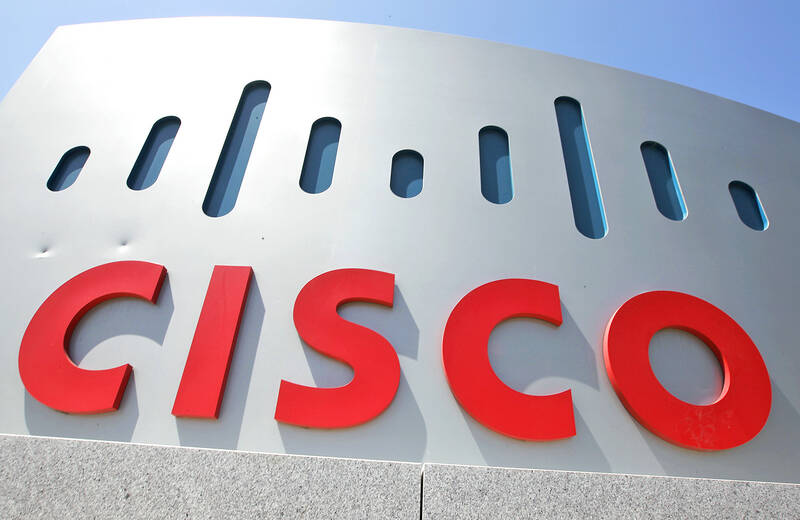Cisco Systems Inc, the largest maker of networking equipment, plans to cut thousands of jobs after a slowdown in corporate technology spending wiped out its sales growth.
A restructuring plan would affect about 5 percent of Cisco’s workforce, the company said on Wednesday.
It had almost 85,000 employees as of last year, suggesting that the move would involve approximately 4,000 jobs. The restructuring is to cost about US$500 million, Cisco said.

Photo: AP
The announcement accompanied a forecast that fell far short of what Wall Street was projecting, sending Cisco shares tumbling in late trading.
Customers are worried about the state of the economy, prompting them to delay orders and rethink how much equipment they need, Cisco chief executive officer Chuck Robbins told analysts on a conference call.
“Customers are pushing things out and putting a bit more scrutiny on them,” he said.
Cisco joins many of the largest technology companies in scaling back. Nearly 35,000 job cuts have been announced this year, according to Layoffs.fyi, which has been tracking technology layoffs since the COVID-19 pandemic.
Sales would be US$12.1 billion to US$12.3 billion in the fiscal third quarter, which ends in April. That compares with an average analyst estimate of US$13.1 billion. Excluding certain items, profit would be US$0.84 to US$0.86 per share, versus a prediction of US$0.92.
For this financial year, the company is now predicting a range of US$51.5 billion to US$52.5 billion. Earnings per share would be US$3.68 to US$3.74, excluding some items. Both of those targets are below what Wall Street is projecting.
Cisco’s adjusted gross margin — the percentage of sales remaining after deducting the cost of production — is expected to be 66 percent to 67 percent this quarter.
In Cisco’s fiscal second quarter, which ended on Jan. 27, revenue fell 6 percent to US$12.8 billion. That was the company’s first contraction in three years. Profit was US$0.87 per share, minus some items.
Analysts had estimated revenue of US$12.7 billion and earnings per shares of US$0.92.
Orders declined 12 percent in the fiscal second quarter and there would not be a quick recovery in the second half as the company had previously hoped, Robbins said.
The company had said that it has been hit by a temporary “pause” in orders from customers, who are busy installing equipment they have already acquired. While that supply logjam should resolve itself in the second half of this year, weak spending by telecoms would likely persist longer than previously projected, Cisco said.
Robbins is trying to reduce Cisco’s sales volatility by offering more networking services — particularly analytics and security features delivered over the Internet.
Adding to that effort, Cisco is acquiring data-crunching software maker Splunk Inc for US$28 billion, a deal announced in September last year.

To many, Tatu City on the outskirts of Nairobi looks like a success. The first city entirely built by a private company to be operational in east Africa, with about 25,000 people living and working there, it accounts for about two-thirds of all foreign investment in Kenya. Its low-tax status has attracted more than 100 businesses including Heineken, coffee brand Dormans, and the biggest call-center and cold-chain transport firms in the region. However, to some local politicians, Tatu City has looked more like a target for extortion. A parade of governors have demanded land worth millions of dollars in exchange

An Indonesian animated movie is smashing regional box office records and could be set for wider success as it prepares to open beyond the Southeast Asian archipelago’s silver screens. Jumbo — a film based on the adventures of main character, Don, a large orphaned Indonesian boy facing bullying at school — last month became the highest-grossing Southeast Asian animated film, raking in more than US$8 million. Released at the end of March to coincide with the Eid holidays after the Islamic fasting month of Ramadan, the movie has hit 8 million ticket sales, the third-highest in Indonesian cinema history, Film

Taiwan Semiconductor Manufacturing Co’s (TSMC, 台積電) revenue jumped 48 percent last month, underscoring how electronics firms scrambled to acquire essential components before global tariffs took effect. The main chipmaker for Apple Inc and Nvidia Corp reported monthly sales of NT$349.6 billion (US$11.6 billion). That compares with the average analysts’ estimate for a 38 percent rise in second-quarter revenue. US President Donald Trump’s trade war is prompting economists to retool GDP forecasts worldwide, casting doubt over the outlook for everything from iPhone demand to computing and datacenter construction. However, TSMC — a barometer for global tech spending given its central role in the

Alchip Technologies Ltd (世芯), an application-specific integrated circuit (ASIC) designer specializing in server chips, expects revenue to decline this year due to sagging demand for 5-nanometer artificial intelligence (AI) chips from a North America-based major customer, a company executive said yesterday. That would be the first contraction in revenue for Alchip as it has been enjoying strong revenue growth over the past few years, benefiting from cloud-service providers’ moves to reduce dependence on Nvidia Corp’s expensive AI chips by building their own AI accelerator by outsourcing chip design. The 5-nanometer chip was supposed to be a new growth engine as the lifecycle